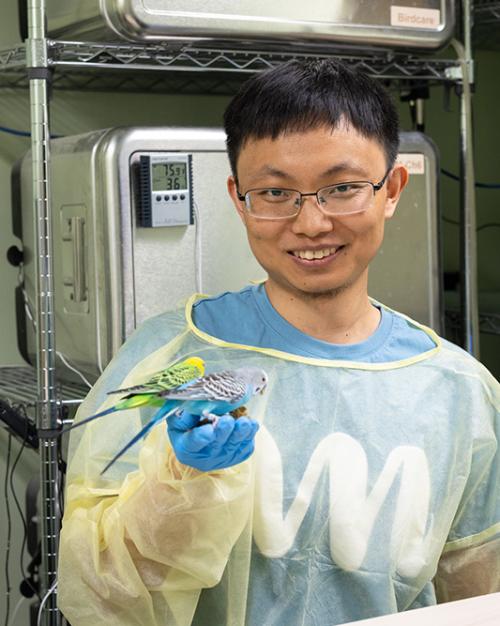Cornell neurobiologist Zhilei Zhao has received a 2025 Fellows-To-Faculty Award from the Simons Foundation to support his advance from postdoctoral fellow to faculty position.
A former Klarman Fellow in neurobiology and behavior in the College of Arts & Sciences (A&S), Zhao is continuing his research into the neural mechanisms of parrot vocalizations in the Goldberg lab with this support. Fellows-to-Faculty recipients get funding toward the end of their postdoctoral careers and a $600,000 faculty research grant commitment over three years.
The 2025 Fellows-to-Faculty Awards help senior postdoctoral researchers who have fresh perspectives on autism and neuroscience transition to tenure-track faculty positions. The nine recipients will be supported through the Simons Foundation Autism Research Initiative (SFARI) and the Simons Collaboration on Plasticity and the Aging Brain (SCPAB). Known previously as the Independence Awards, the program aims to nurture new talent and broaden the community of scientists contributing to the Simons Foundation mission.
“We are excited to welcome these nine talented scientists to our community and to support their innovative approaches to understanding the basic science of autism and cognitive aging,” said Kelsey Martin, executive vice president of autism and neuroscience at the Simons Foundation. “We look forward to the advances they will make, and to following them on their professional journeys.”
As a Klarman Fellow, Zhao worked on understanding how parrots’ brains achieve their advanced and rare vocal abilities. He led 2023 research that found drastically different effects in brain mechanisms of songbirds and parrots, providing a clue into how parrot (and human) brains allow continuous, flexible vocal learning.
At Cornell, Zhao has worked across fields to contribute groundbreaking work, said Jesse Goldberg, professor of neurobiology and behavior and the Dr. David Merksamer and Dorothy Joslovitz Merksamer Professor in Biological Sciences (A&S), Zhao’s Klarman Fellow faculty host.
“It’s an incredibly exciting time for the field of animal communication,” Goldberg said. “The field is being powered by those rare scientists, including Zhilei Zhao, who can deploy the latest AI and neurotechnical methods.”
Zhao has used AI to identify vocal primitives – basic sounds, analogous to the phonemes that make up words in human speech – in the long warble songs of Budgerigar parrots. He has applied modern brain tracing and inactivation methods to identify candidate brain areas that may generate vocal output. Zhao has also used neural recordings to discover, for the first time in any nonhuman animal Goldberg said, premotor neural representations for vocal primitives. He has also made several side discoveries, such as budgerigar dueting and vocal labeling, that are being pursued by graduate students in the Goldberg group.
With the support the Simons Foundation provides, Zhao is now building upon his previous work, studying how the phoneme-like neural presentation in the parrot brain is learned through social interactions, and how social brain circuits modulate vocal motor circuits.




